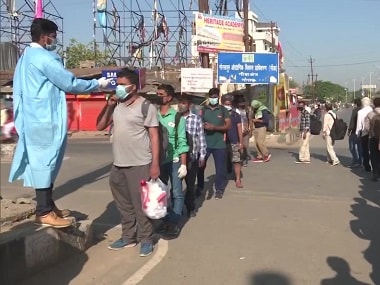Last week, after a scuffle broke out in the food queue, three shelter homes in Delhi’s Kashmiri Gate packed like sardines with 10,000 stranded migrants, were set on fire. Migrant workers in Surat too have indulged in arson. The migrant crisis is a tinder box waiting to explode.

Migrant workers being screened at Gorakhpur, Uttar Pradesh. ANI
The biggest flaw in the much-delayed Finance Minister’s PM Garib Kalyan relief package is that it poignantly ignored migrants. The main critique against the COVID-19 lockdown has been the utter lack of preparedness. Now as hunger escalates and tempers flare, before any extension at the very least the government must announce an expanded relief package. There are three essential components to at least prevent food riots:
- Universalise the Public Distribution System
Only if the Centre steps in to universalise the public distribution system, will the time bomb of mounting hunger be truly defused.
So far, the PM Garib Yojana provides additional free foodgrain only to those families with ration cards issued as per the National Food Security Act (NFSA, 2013). Invariably, the poorest and most marginalised families have also been left out. Further, with the Aadhaar updation process, scores of genuine beneficiaries, including migrants, have been struck off the lists as “ghosts”. In addition, for the last decade, since the 2011 Census, these NFSA ration card lists have not been updated. Therefore, in 2020 based on population projections, 44 percent of Indians do not have access to this lifeline.
Thankfully some state government such as Rajasthan and Chhattisgarh have expanded coverage with monies from their own coffers. But many impoverished states with a history of starvation deaths such as Jharkhand, Uttar Pradesh, Madhya Pradesh, Maharashtra and Bihar do not have a universal PDS. Often the same families which do not have a ration card are also excluded from pensions and Jan Dhan accounts.
As of now, the Central government has meaninglessly offered that state governments can purchase foodgrains for the non-NFSA families at near-market rates. Instead, this is a golden opportunity for the food ministry to release its mountain of foodgrain stocks, three and a half times more than the buffer norm.
- Community kitchens in every panchayat
As the Kerala government has recognised, many elderly, destitute people, migrants, differently-abled and homeless people are unable to cook in the present circumstances of the lockdown. The Centre now reimburses ₹100 to ensure three meals per day in night shelters. As per the home ministry’s submission in the Supreme Court, six lakh migrants are currently housed in 21,000 relief camps where they receive cooked meals. Though Delhi and Kerala have scaled up night shelters and community kitchens exponentially, even they are teetering on the edge.
But the need of the hour is to open such free community kitchens in every panchayat. Schools and Anganwadis offer good alternatives. Jharkhand apart from dal-bhat kendras has opened kitchens in several police stations. Odisha’s Aahar canteens too now offer free meals. But Maharashtra’s Shiv Bhojan canteens are still not free, even as migrants struggle to feed their bellies.
- Universal Cash Grant:
During the lockdown, most sources of income have vanished. Therefore, it is important to offer cash in people’s hand as a measure of livelihood and dignity. Telangana is one of the few states which has promised that even migrant workers will receive 12 kilos of foodgrain and ₹500 in cash while Delhi has promised ₹5000 to autorickshaw and truck drivers.
While the Central government’s modest transfers to 200 million Jan Dhan accounts in women’s name and 32 million pensioners is a start, there is an urgent need to scale up the quantum and coverage of these transfers. The 54 million active National Rural Employment Guarantee Act households with job cards, in particular, deserve compensation at minimum wages in lieu of work during the enforced lockdown. Further, till the lockdown is lifted similar to Andhra Pradesh these transfers must be delivered in cash to each home.
The harrowing tales of suicides and starvation deaths due to hunger during this lockdown phase seem to worsen with each passing day. Twenty-two migrant workers collapsed on their way home. The indignity and humiliation that India’s poor continue to suffer in this unplanned lockdown is utterly unacceptable. Migrants, in particular, need a clear plan to support to return home.
Before a lockdown extension, a comprehensive relief package is essential. After all, with the migrant crisis on the brink, it will only take a spark.
The author is a visiting fellow at the Institute for Human Development.
COURTESY- First Post

Leave a Reply